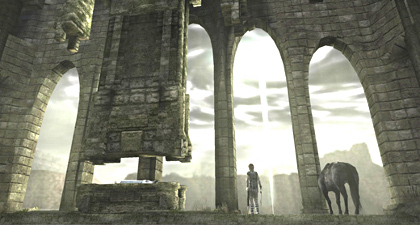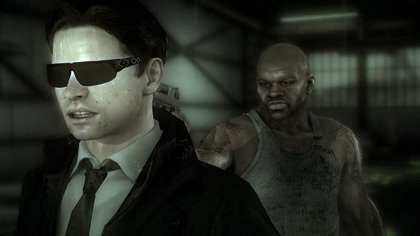At such intervals, whatever empathy the designers may be attempting to nourish is collapsed, flattened into functionalism. Characters cease to be characters, are reduced to instruments of victory or defeat: pawns on a chessboard, bullets in a clip. The game’s status as a game, as a construct in which right or wrong decisions are possible, acts like a sea anchor on its status as narrative vehicle, dragging its affective timbre down to the mundane satisfaction of victory, or the mundane irritation of defeat.
It might be objected that RPGs are a little out of touch, and that the oil-on-water separation of plot from mechanics these titles cheerily espouse would be unacceptable in any other genre. Very well, let’s consider something more ambitious. Let’s look at Heavy Rain.
On the face of it, Quantic Dream’s wonderfully oppressive PS3 debut poses serious problems for our analysis. It purports to do away with one of the industry’s most tedious sights – the game-over screen – and thus with the closed circuit of win-or-lose. There are no true “failures” here, say the creators, nor true “successes”, but simply choices, or rather a choice, the choice of which story you want to tell, with most eventualities lavishly catered for in the script.
But even Heavy Rain has its success-and-failure aspect. Its glorious, straggly bouquet of plot-lines is held together by quick-time prompts, tests of coordination and reflex with obvious, immediate positive and negative outcomes. The quick-time sequences are beautifully integrated with the on-screen action, and their long-term consequences are often engagingly hard to predict, but these achievements do not, I feel, allay the fact that the Heavy Rain experience is frequently akin to that of playing Snap.
And while it professes to scorn the notion of “right” or “wrong” endings, the game has a “right ending” of a sort: a 100% completion screen, with each and every line of dialogue uncovered, each ending cinematic exposed, all the Trophies collected. In this regard, Quantic Dream has done no more than iterate on the legendary Pokemon dogma “Gotta Catch ‘Em All”.
Videogames can move us to sobs, or laughter, or wrath, but as long as their distinctiveness rests in the completion of tasks they will always eventually revert to a less dramatic, less extraordinary register of feeling: the quiet triumph of completing a crossword puzzle or the fleeting annoyance of losing a coin toss. To recognise this is not to concede “defeat” in the face of cultural competitors, as some would have it, but simply to acknowledge that one medium is not another. Artforms are defined as much by their limitations as their capabilities.
Opinions, eh? The great thing about them is that everybody’s allowed one. Feel free to post yours here or in the forum.







 Satoru Iwata Video Interview - the late Nintendo president spoke with Kikizo in 2004 as 'Nintendo Revolution' loomed.
Satoru Iwata Video Interview - the late Nintendo president spoke with Kikizo in 2004 as 'Nintendo Revolution' loomed. Kaz Hirai Video Interview - the first of Kikizo's interviews with the man who went on to become global head of Sony.
Kaz Hirai Video Interview - the first of Kikizo's interviews with the man who went on to become global head of Sony. Ed Fries Video Interview - one of Xbox's founders discusses an epic journey from Excel to Xbox.
Ed Fries Video Interview - one of Xbox's founders discusses an epic journey from Excel to Xbox. Yu Suzuki, the Kikizo Interview - we spend time with one of gaming's most revered creators.
Yu Suzuki, the Kikizo Interview - we spend time with one of gaming's most revered creators. Tetris - The Making of an Icon: Alexey Pajitnov and Henk Rogers reveal the fascinating story behind Tetris
Tetris - The Making of an Icon: Alexey Pajitnov and Henk Rogers reveal the fascinating story behind Tetris Rare founders, Chris and Tim Stamper - their only interview? Genuinely 'rare' sit down with founders of the legendary studio.
Rare founders, Chris and Tim Stamper - their only interview? Genuinely 'rare' sit down with founders of the legendary studio. The History of First-Person Shooters - a retrospective, from Maze War to Modern Warfare
The History of First-Person Shooters - a retrospective, from Maze War to Modern Warfare